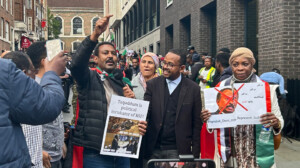FFC apology for cancelled North Darfur symposium
The Field Work Committee of the Forces for Freedom and Change (FFC) has expressed its concern for events in the North Darfur capital of El Fasher on Sunday evening after a group of youths disrupted proceedings and attacked FFC leaders.
 El Fasher football stadium - youths chant slogans disrupting FCC symposium (Social media)
El Fasher football stadium - youths chant slogans disrupting FCC symposium (Social media)
The Field Work Committee of the Forces for Freedom and Change (FFC) has expressed its concern for events in the North Darfur capital of El Fasher on Sunday evening after a group of youths disrupted proceedings and attacked FFC leaders.
The FFC organised the mass meeting at the El Fasher football stadium as part of a national tour to mobilise popular support for the transitional ruling coalition in Sudan.
Leading FFC members including National Umma Party (NUP) Secretary-General Sara Nugdalla, Mohamed Nagi Alasam of the Sudanese Professionals Association (SPA), Sudanese Congress Party (SCP) Secretary-General Khalid Omer, and Osman Taha of the Sudanese Communist Party planned to address the public.
When Mohamed Naji El Asam, a young doctor who was detained in January after representing the Declaration of Freedom and Change in a video message on YouTube, took the podium to speak, a group of youths drowned him out, shouting “No to marginalisation”, and “Where is peace? Where is the revolution?”
The youths carried banners protesting the rejection by the political coalition of the demands made by the Darfur armed movements for peace in Sudan.
In a statement on Monday, the FFC apologised to the residents of El Fasher and all people of Darfur for cancelling the mass symposium. The FFC described what happened as “individual conduct, not representing the residents of the city who welcomed us hospitably”.
‘Revolution hijacked’
As reported by Radio Dabanga on Sunday, the Sudan Revolutionary Front (SRF), a coalition of armed movements, rejects the list of nominations of ministers for the interim government. It called on Prime Minister Abdallah Hamdouk to conduct broader consultations, including the Sudan Revolutionary Front, before forming a government.
“The revolution has been taken over by individuals and political forces that use the revolution to get power themselves,” the SRF says.
According to the SRF, its leadership has not been contacted about the nominations at all.
In a statement signed by Minni Minawi, leader of the Sudan Liberation Movement (SLM-MM), and Malik Agar, leader of the Sudan People’s Liberation Movement-North faction Agar, the SRF described the nominations of ministers as “quotas in its ugliest form”.
The SRF accused those forces of not being interested in resolving issues like war and full citizenship for all, in respecting diversity, and in achieving the goals of the revolution. “It is an attempt to capture the harvest of 30 years of struggle of the people throughout Sudan.”
What is needed is a restructuring of the state, not a reproduction of the former regime, the statement of the rebels claims.
The SRF leaders are currently in the South Sudanese capital of Juba, where South Sudanese President Salva Kiir is mediating between the SRF and the present Sudan government in order to achieve peace and address the roots of the crisis.
Radio Dabanga’s editorial independence means that we can continue to provide factual updates about political developments to Sudanese and international actors, educate people about how to avoid outbreaks of infectious diseases, and provide a window to the world for those in all corners of Sudan. Support Radio Dabanga for as little as €2.50, the equivalent of a cup of coffee.












 and then
and then